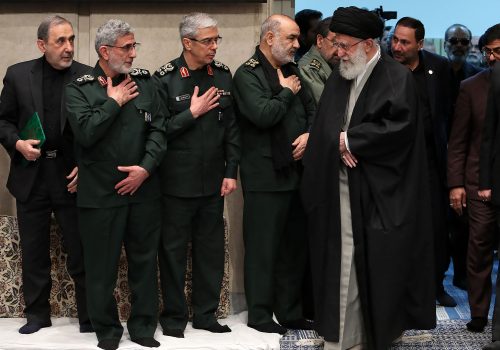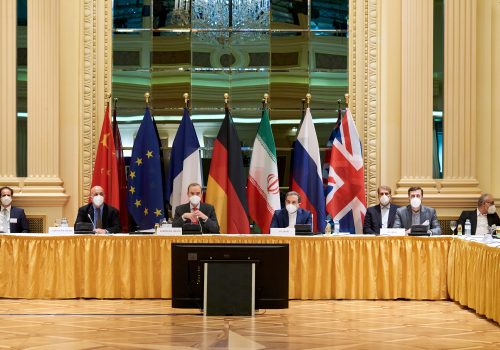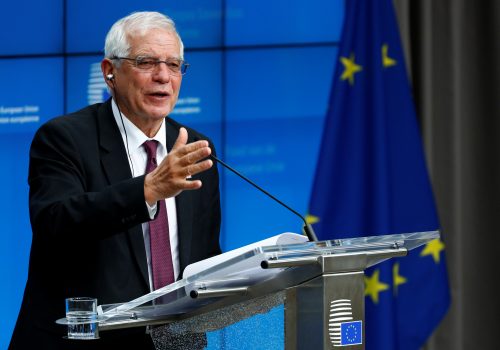‘Poison pill sanctions’ are hard for Vienna negotiators to swallow
Another round of negotiations—telephone game style—have wrapped in Vienna, Austria. Reports suggest that the United States and Iran are moving closer to agreeing on how a return to the 2015 Joint Comprehensive Plan of Action (JCPOA) would work. The primary conundrum is over how to address sanctions imposed by the Donald Trump administration that are “inconsistent with the JCPOA” and which the US acknowledges will have to be lifted.
Defining that phrase is a critical challenge for both sides, as former President Trump and his administration imposed numerous sanctions on Iran using US counterterrorism authorities—which carry the most severe restrictions—that were clearly intended to make it harder for a successor administration to rejoin the deal. But the Trump administration also imposed a large list of sanctions that would have been allowed under the JCPOA and may well have been imposed by the US under Hillary Clinton had she won the presidency in 2016. I have referred to the former as “poison pill sanctions,” and they are clearly the sticking point in the ongoing negotiations and the focus of the technical working groups in Vienna.
At its most simple, the phrase “inconsistent with the JCPOA” means sanctions that have been applied for reasons permitted by the deal—such as financing of terrorist groups—but whose continued application would effectively ruin any prospect of Iran receiving economic benefit from returning to its commitments. This was the key incentive Iran sought—effected via sanctions relief—in exchange for curbs on its nuclear program. In fact, the deal stipulates that the US will seek to prevent interference with Iran realizing the economic benefit of the lifted sanctions.
The most obvious candidates for some form of sanctions lifting are (as I’ve written and the press has reported): the Central Bank of Iran (CBI), the National Iranian Oil Company, and the National Iranian Tanker Company. The Trump administration sanctioned them all for providing alleged support to terrorist groups, specifically the Islamic Revolutionary Guard Corps, which as a technical matter is an area of sanctions not restricted by the JCPOA. However, the continued application of the terrorism-related sanctions would remove these entities from the scope of sanctions relief agreed under the nuclear accord originally. Given their centrality to the Iranian economy, it would torpedo the ability of Iran to receive economic benefit from the lifting of sanctions. After all, without these entities, Iran could not openly export oil or receive any payments in foreign currency for such oil exports—key benefits to Iran from agreeing to the nuclear deal.
Conversely, there are a number of Trump-era sanctions that are more likely to remain in place because they would have been allowed under the the JCPOA and because they do not fundamentally undermine effective implementation of the deal should they remain. The clearest example of this category are the sanctions imposed under Trump on the two men who abducted former FBI agent Robert Levinson in 2007. US Secretary of State Antony Blinken specifically mentioned those sanctions in his statement in March on the anniversary of Levinson’s abduction—a strong indication that the Biden administration does not intend to lift sanctions on those two individuals.
The more interesting points of discussion between the US and Iranian sides are likely to be the entities that fall somewhere in between. Take Bank Sina, for example, which the Trump administration designated under counter-terrorism authorities in late 2018. It is certainly not the largest bank in Iran, but the Iranian delegation in Vienna may well argue that any continued application of terrorism sanctions against it would be inconsistent with the original nuclear deal’s terms. The US negotiating team will need to decide whether they believe the Sina Bank terrorism sanctions were part of the “sanctions wall” the Trump administration tried to erect to prevent a return to the JCPOA, or if they believe the sanctions were justifiable and ought to remain.
These calculations, in large part, are what the negotiations are about. These teams from the Iranian and US sides need to work through the hundreds of new designations the Trump team imposed to figure out what the final list of sanctions relief will be. This is time-consuming, intense work, requiring serious attention to the details and the background of each of these individual sanctions.
As if this weren’t enough, there is one other critical hurdle to address: how the sanctions effects are removed. Iranian sources assert that Tehran will not settle for simply suspending or waiving sanctions and will only agree to complete removal. This stance appears to reflect—in part at least—the challenge of how to remove the effect of the terrorism sanctions. As I have noted before, the evidence of the CBI’s support to groups the US has designated as terrorist organizations is clear. And, as a political issue, removing terrorism sanctions on the CBI could be a challenge with an assertive Congress trying to weigh in on any return to the deal—albeit without the Republican majorities that would be needed for legislative action.
The sanctions could technically be lifted via a combination of Treasury Department licensing and State Department waivers. But Iran may well fear that any hint of retained terrorism sanctions—relief or not—will prove fatal to the chances that any large foreign bank will choose to engage with the CBI or others in the same situation. Where the balance falls on this question is likely to be another key sticking point in the Vienna negotiations.
So while the reporting after this latest round of sanctions has been cautiously upbeat, with some assessing that the negotiations are at a halfway point, it may be a mistake to assume smooth sailing from here or a near-term solution to some very difficult issues.
Brian O’Toole is a nonresident senior fellow with the Atlantic Council’s GeoEconomics Center. He is a former senior adviser to the director of the Office of Foreign Assets Control (OFAC) at the US Department of the Treasury. Follow him on Twitter @brianoftoole.
Image: Iranian Deputy at the Ministry of Foreign Affairs Abbas Araghchi and Iran's ambassador to the U.N. nuclear watchdog Kazem Gharibabadi leave a hotel, in Vienna, Austria, April 20, 2021. REUTERS/Leonhard Foeger


